Why Do Dogs Lick Each Other’s Eyes? [Gross]
Dog owners may observe numerous traits their pets have, which are confusing. But all of these strange behaviors have reasons behind them. So why do dogs lick each other’s eyes?
There may be different causes for your four-legged friend to do this.
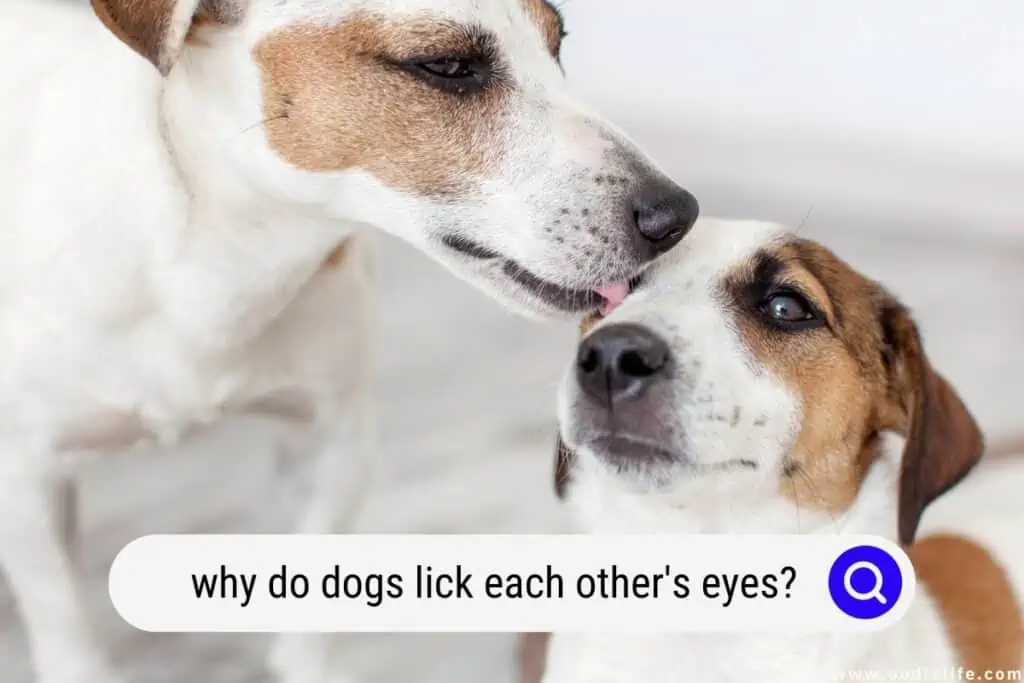
Let’s explore why some dogs exhibit this odd task of licking each other’s eyes and if you should do anything about it.
Is Licking Eyes Normal?
It will help you to relax knowing that when a dog likes another’s eyes, it’s completely normal behavior. Generally, when this happens, your dog doesn’t have an issue, and you don’t have to run out and be assessed by a veterinarian or require a specialized dog trainer.
Although this action may seem gross or unsanitary to us, it can carry several different meanings for animals. All of which are not dirty or unhealthy.
But, if you notice that your dog is excessively licking, there could be an underlying issue that needs addressing. Dogs that lick another’s eyes can be a standard greeting, but an obsession with eye licking will require a trip to your veterinarian for further examination.
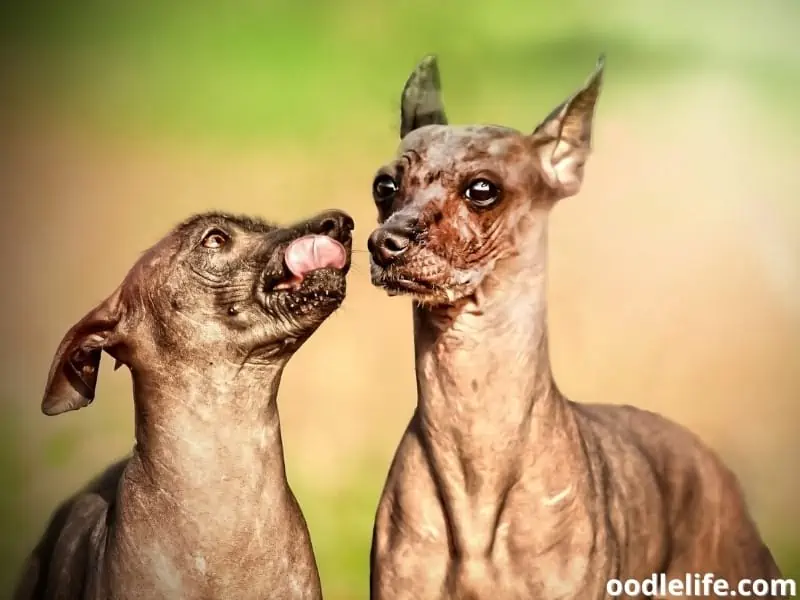
Reasons Why Dogs Lick Each Other’s Eyes
If you have a four-legged friend that tends to lick other dog’s eyes, you can rest easy knowing that this behavior is probably due to one of these reasons:
- Grooming
- Parenting care
- Affection and bonding
- Greeting
- Wound cleaning
- Taste
- Submission
- Communication
- Obsessive disorder
Grooming
One of the top reasons why dogs lick each other’s eyes is for grooming. The eye area can collect dirt, debris, eye goop, and show tear stains without regular cleaning. Additionally, dogs who bond to one another will help groom each other since reaching their own eyes with their tongue is challenging.
You may notice that dogs are more apt to lick the eyes of other animals with long fur or are susceptible to tear-stained eyes. So this grooming behavior from your pet could be their way of helping another dog keep clean.
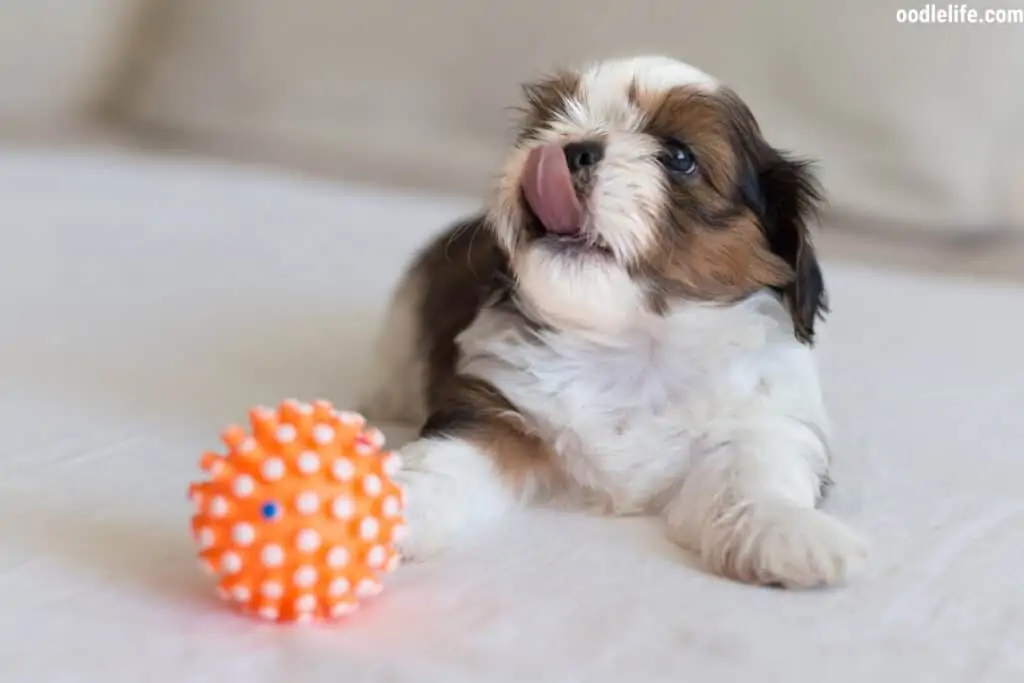
Parenting Care
You may also notice that mothers or fathers of young litters will lick the puppies’ faces, eyes, and ears. This licking is an instinct for grooming the young pups as they grow.
Additionally, older dogs with younger pack members may take on a parenting role and help keep young puppies’ eyes clean. But, your dog does not have to be older than another to take on a parenting role. Some pets will act motherly with older, senior dogs and lick their eyes in a caring fashion even though they are years younger.
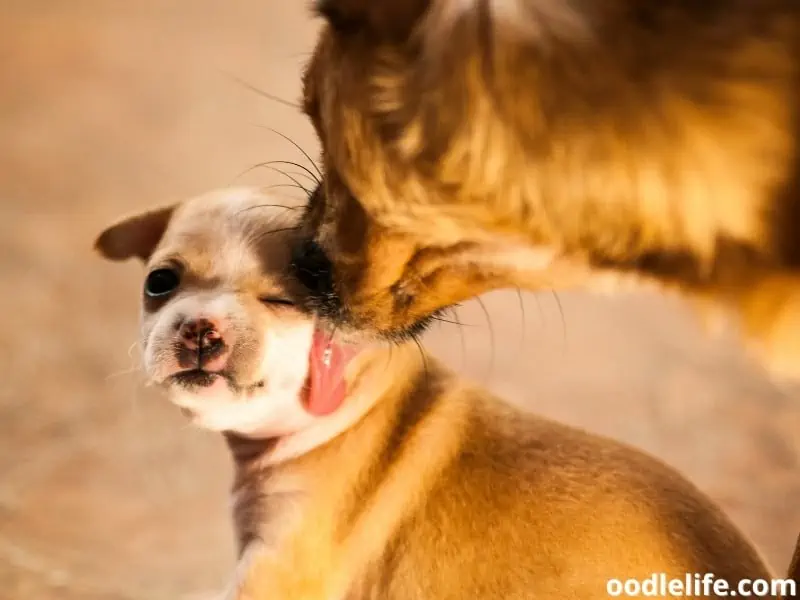
Affection and Bonding
Licking can signify affection for dogs, and it does not have to be limited to the eye region. Some furry friends will lick another dog’s eye, ears, and entire face to show the signs of affection. Showing affection can help enforce the bond between two dogs, making eye-licking behavior a standard part of their everyday routine.
Some dog owners may notice that their dog will like another’s eyes with some pets but not others. This diversity certainly shows the level of affection for each animal. Each dog is unique and may show love this way but refrain from it when meeting new animals.
You may only see your pet licking another’s eyes once they are comfortable with a friend’s pet and spend time together.
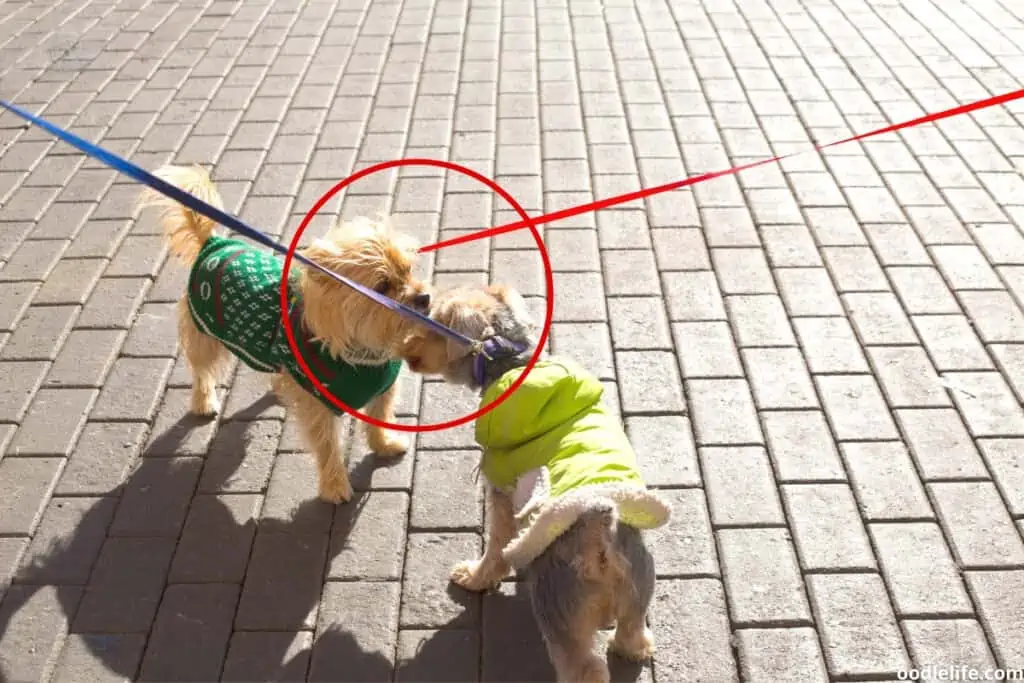
Greeting
Dogs communicate differently than humans and other animal species. Licking another’s eyes can be part of their friendly greeting to each one other. Your pet may lick another dog’s face, ears, and eyes to say hello as they meet them at the dog park or while out for a walk.
This greeting is a non-threatening way to let the other animal know they are friendly and want to play with them. But, licking another dog’s eyes should only last a few minutes. If it continues for an extended period, you may want to explore other reasons for this behavior.
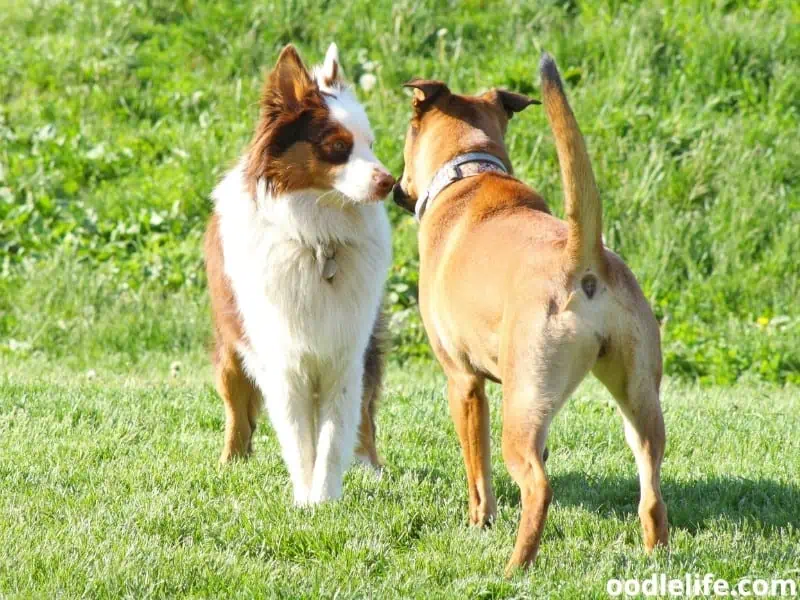
Wound Cleaning
Animals will instinctively lick their wounds and those of others to help keep them clean and avoid infection. If another dog has a cut, scrape, or other wounds around their eye, your pet may take to licking it as a way to help them.
Because a dog’s tongue only reaches so far, other pets may not have the best access to the area around their eyes. However, if your dog is motivated, they could take to licking another pet’s eyes to clean a wound.
Taste
Some dogs will have unique preferences when it comes to taste. For example, a dog’s eye can collect debris and eye crust throughout the day or after sleeping, which may carry a slightly salty taste that your animal may find appealing.
Although your pet may not desire salty items, it could still be a favorable result of eye licking that they enjoy.

Submission
Licking another dog can be a sign of submission for your pet. This behavior can tell the other animal they are not a threat, and they consider the other dog in a higher position of authority than themselves. Dogs will lick another animal’s face and eyes to show respect and appease them.
New puppy owners may observe this behavior with littermates that lick their parent’s faces and eyes. Through this behavior, puppies learn their place in the hierarchy and where they belong with animals of different ages and positions within their pack.
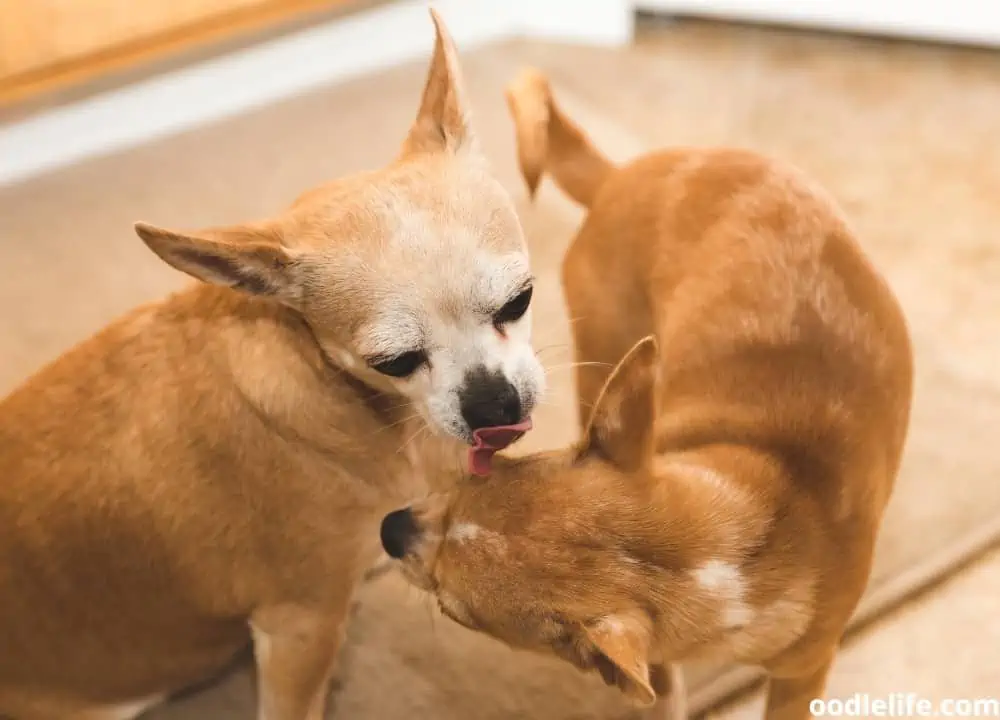
Communication
Sometimes licking another dog’s eyes is a trait that will help get their attention. Some dogs will exhibit this behavior to communicate that they need something. Because animals are limited to barking and physical characteristics, licking is a quick way to get the point across.
For example, young puppies may lick their mother’s eyes when hungry to let her know it is feeding time. Alternatively, dogs may lick each other’s eyes to grab the dog’s attention so they will play with them.
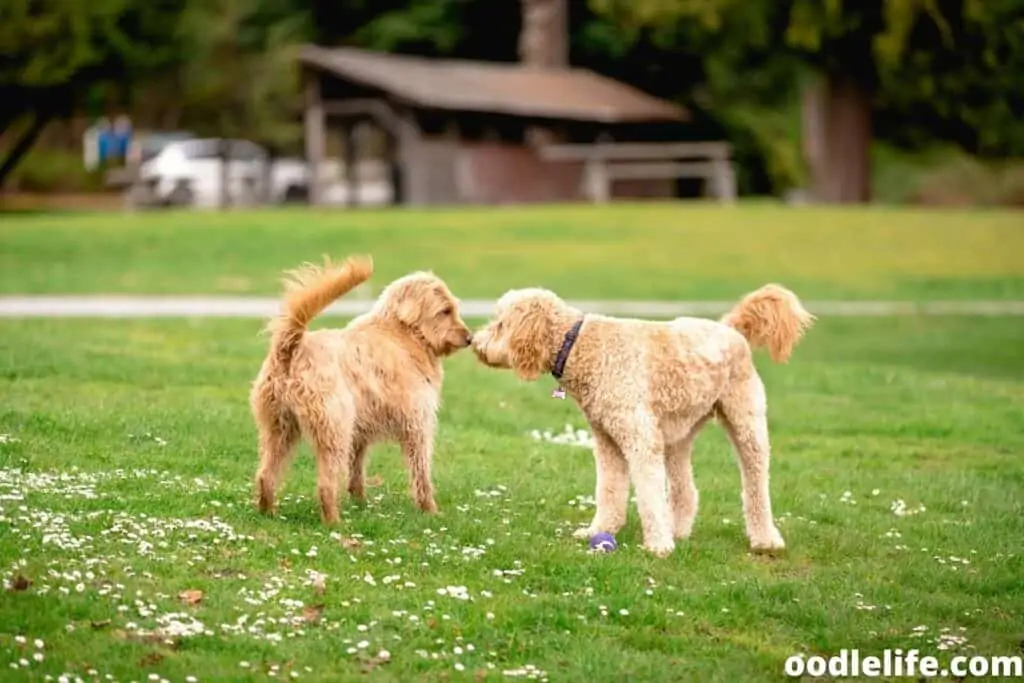
Obsessive Disorder
One concerning reason that your dog licks another animal’s eyes is from an obsessive disorder. Continuous licking can harm another dog, so if your pet is relentless with eye licking, you should intervene. If you suspect your pet is obsessively licking other animals, talk to your local veterinarian as soon as possible.
Discouraging Eye-Licking Behaviors
If your dog’s eye-licking behaviors are problematic, you can take action to put a stop to them. If you fear your pet has an obsessive disorder, consult your local veterinarian for further help. These trained professionals can provide resources and tools for dealing with this behavior.
If your dog occasionally licks other dogs’ eyes and you want to discourage this trait, you can redirect them. You must stop the action as soon as it starts and redirect your pet to a toy or treat they would prefer over licking the other dog. The reward should be more appealing than the other animal, and your four-legged friend will soon learn there is no benefit to licking other dogs and their eyes.
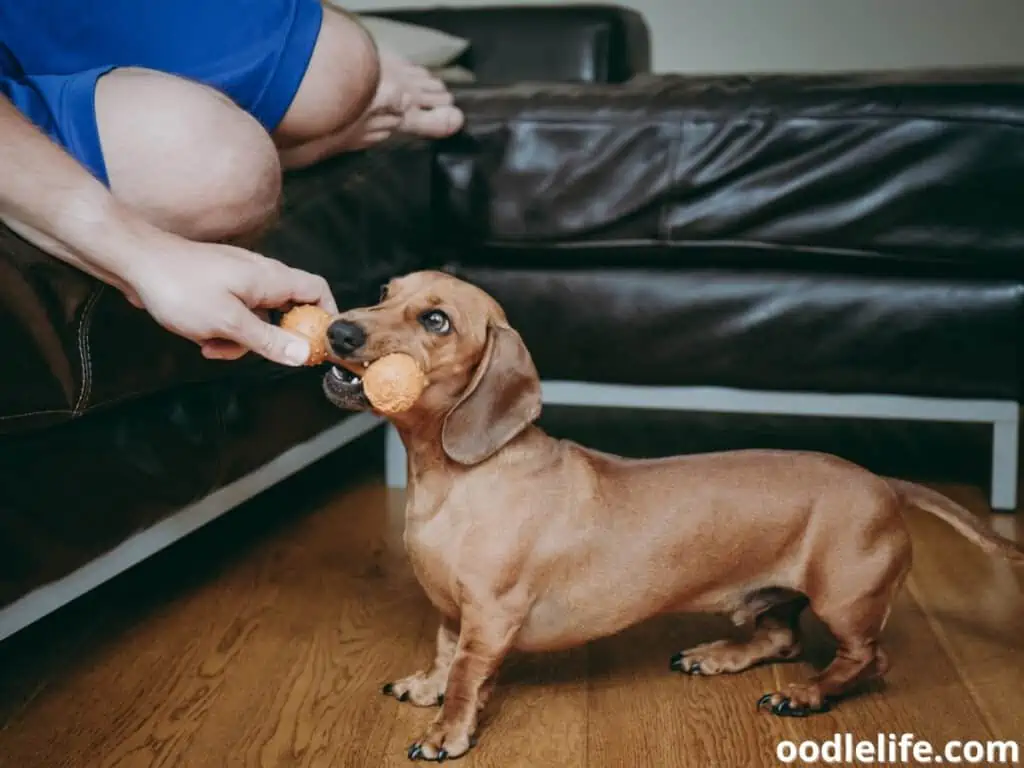
The Takeaway
Many pet owners will worry, “Why do dogs lick each other’s eyes?” but there is often no concern. Your four-legged friend could be licking another pet’s eyes to say hello, clean and groom them, or bond with the other animal. Although eye licking may seem strange or gross to us, it is generally quite normal for dogs.
However, if your dog exhibits excessive licking behaviors with other dogs’ eyes, you should seek guidance from your local veterinarian. Your pet may have an obsessive disorder that requires further monitoring and care. Knowing the difference between communication and excessive licking is beneficial when dealing with your dog’s habits.